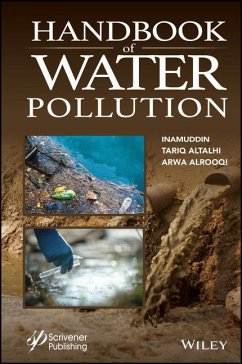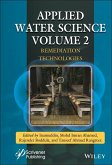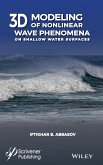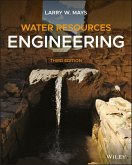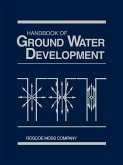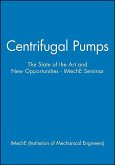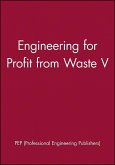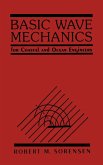Handbook of Water Pollution
Herausgeber: Inamuddin; Alrooqi, Arwa; Altalhi, Tariq
Handbook of Water Pollution
Herausgeber: Inamuddin; Alrooqi, Arwa; Altalhi, Tariq
- Gebundenes Buch
- Merkliste
- Auf die Merkliste
- Bewerten Bewerten
- Teilen
- Produkt teilen
- Produkterinnerung
- Produkterinnerung
Handbook of Water Pollution discusses a wide range of contaminants heavily affecting our environment and water bodies. The chapters discuss heavy metals, metalloids, pesticides, explosives, toxic chemicals, dyes, plastics, e-wastes, fertilizers, detergents, nitrates/nitrites, phosphates, hydrocarbons, and fecal wastes, along with their sources of action against our environment, their methods of analysis, and finally, their treatments are all presented in detail. Our environment is heavily affected due to extreme human activities. Environmental pollution is a major concern worldwide. Within…mehr
Andere Kunden interessierten sich auch für
![Applied Water Science, Volume 2 Applied Water Science, Volume 2]() Applied Water Science, Volume 2254,99 €
Applied Water Science, Volume 2254,99 €![3D Modeling of Nonlinear Wave Phenomena on Shallow Water Surfaces 3D Modeling of Nonlinear Wave Phenomena on Shallow Water Surfaces]() Iftikhar B Abbasov3D Modeling of Nonlinear Wave Phenomena on Shallow Water Surfaces230,99 €
Iftikhar B Abbasov3D Modeling of Nonlinear Wave Phenomena on Shallow Water Surfaces230,99 €![Water Resources Engineering Water Resources Engineering]() Larry W MaysWater Resources Engineering158,99 €
Larry W MaysWater Resources Engineering158,99 €![Handbook of Ground Water Development Handbook of Ground Water Development]() Roscoe Moss CompanyHandbook of Ground Water Development285,99 €
Roscoe Moss CompanyHandbook of Ground Water Development285,99 €![Centrifugal Pumps Centrifugal Pumps]() Imeche (Institution of Mechanical Engineers)Centrifugal Pumps184,99 €
Imeche (Institution of Mechanical Engineers)Centrifugal Pumps184,99 €![Engineering for Profit from Waste V Engineering for Profit from Waste V]() Pep (Professional Engineering Publishers)Engineering for Profit from Waste V334,99 €
Pep (Professional Engineering Publishers)Engineering for Profit from Waste V334,99 €![Basic Wave Mechanics Basic Wave Mechanics]() Robert M SorensenBasic Wave Mechanics204,99 €
Robert M SorensenBasic Wave Mechanics204,99 €-
-
-
Handbook of Water Pollution discusses a wide range of contaminants heavily affecting our environment and water bodies. The chapters discuss heavy metals, metalloids, pesticides, explosives, toxic chemicals, dyes, plastics, e-wastes, fertilizers, detergents, nitrates/nitrites, phosphates, hydrocarbons, and fecal wastes, along with their sources of action against our environment, their methods of analysis, and finally, their treatments are all presented in detail. Our environment is heavily affected due to extreme human activities. Environmental pollution is a major concern worldwide. Within this, water pollution is one of the major challenges that puts the total ecology at risk. Water pollution is alarming everywhere; many governing authorities believe it is also an unavoidable result of human activity. However, the economic cost of water pollution far outweighs the benefits of skimping on its cause. Water pollution is not just merely related to financial cost but related to all living beings. Toxic waste is getting into the water bodies in various regions, causing many illnesses in humans and poisoning other living things. The destruction of any single component of our ecosystem can have a devastating effect on our biodiversity. Therefore, it is necessary to understand the causes of pollution, their nature and mechanism, and, at the same time, study the remedies. The major causes of water pollution are industrial waste, sewage, plastics, oil leakage, biological organisms, toxic chemicals and radioactive waste, and so on. A tremendous amount of research work is going on around the world to understand the causes, their mechanism, and solutions. Many new works are published every day, therefore it's important to gather some of the most relevant findings in one place. This will serve as a link between collected knowledge and current advancements, while also facilitating future thinking.
Hinweis: Dieser Artikel kann nur an eine deutsche Lieferadresse ausgeliefert werden.
Hinweis: Dieser Artikel kann nur an eine deutsche Lieferadresse ausgeliefert werden.
Produktdetails
- Produktdetails
- Verlag: Wiley
- Seitenzahl: 560
- Erscheinungstermin: 2. April 2024
- Englisch
- Gewicht: 1066g
- ISBN-13: 9781119904809
- ISBN-10: 1119904803
- Artikelnr.: 66157474
- Herstellerkennzeichnung
- Libri GmbH
- Europaallee 1
- 36244 Bad Hersfeld
- gpsr@libri.de
- Verlag: Wiley
- Seitenzahl: 560
- Erscheinungstermin: 2. April 2024
- Englisch
- Gewicht: 1066g
- ISBN-13: 9781119904809
- ISBN-10: 1119904803
- Artikelnr.: 66157474
- Herstellerkennzeichnung
- Libri GmbH
- Europaallee 1
- 36244 Bad Hersfeld
- gpsr@libri.de
Inamuddin, PhD, is an assistant professor at the Department of Applied Chemistry, Zakir Husain College of Engineering and Technology, Faculty of Engineering and Technology, Aligarh Muslim University, Aligarh, India. He has extensive research experience in multidisciplinary fields of analytical chemistry, materials chemistry, electrochemistry, renewable energy, and environmental science. He has worked on different research projects funded by various government agencies and universities and is the recipient of awards, including the Department of Science and Technology, India, Fast-Track Young Scientist Award and Young Researcher of the Year Award 2020 from Aligarh Muslim University. He has published about 210 research articles in various international scientific journals, 18 book chapters, and 170 edited books with multiple well-known publishers. His current research interests include ion exchange materials, a sensor for heavy metal ions, biofuel cells, supercapacitors, and bending actuators. Tariq Altalhi, PhD, is working as an associate professor in the Department of Chemistry at Taif University, Saudi Arabia, where he has served as the head of the chemistry department and vice dean of the science college. He has co-edited various scientific books and established key contacts in major industries in Saudi Arabia. His group is involved in fundamental multidisciplinary research in nanomaterial synthesis and engineering, characterization, and application in molecular separation, desalination, membrane systems, drug delivery, and biosensing. Arwa Alrooqi is pursuing her PhD in appplied chemistry and working as lecturer at the Department of Chemistry, Faculty of Science, Al Baha University, Saudi Arabia. Her thesis title is "Smart Organic Semiconductors Materials". She has published several research articles in the journals of international repute. She is actively involved in fundamental multidisciplinary research in the area of organic semiconductors and nanomaterials synthesis and engineering, characterization, and their application in smart windows.
1 Introduction to Water Pollution 1
Hira Munir, Areeba Kashaf, Mahnoor Masood, Rabia Sajid, Hira Amjad, Tahreem
Shehzadi and Jawayria Najeeb
1.1 Pollution 2
1.2 What is Water Pollution? 2
1.3 Prevalence of Water Pollution 4
1.4 Categories of Water Pollution 4
1.5 Water Pollutants 7
1.6 Kinds of Water Pollution 11
1.7 Determination of Water Quality Parameters 13
1.8 Sources of Water Pollution 15
1.9 Effects of Water Pollution on Humans and Animals 17
1.10 Prevention of Water Pollution 19
1.11 Control and Prevention of Water Pollution by Biotechnology 22
1.12 Conclusion 23
2 Impact of Water Pollution & Perspective Techniques to Mitigate It: An
Overview 29
Ambika Sudan, Arpita Ghosh, Mehak Verma and Pushpachaudhary Tomar
2.1 Introduction 30
2.2 Causes of Water Pollution 33
2.3 Effects of Water Pollution on Plant Growth 35
2.4 Techniques of Treating Water Pollution 37
2.5 Removal of Pollutants Through Different Nanomaterial 48
2.6 Discussion and Conclusion 56
3 Pollution of Ground and Surface Waters with Agrochemicals 65
Aloo B. N.
3.1 Introduction 65
3.2 A Recounting of the Global Production and Consumption of Agrochemicals
67
3.3 Characteristics of Agrochemicals 70
3.4 Occurrences and Levels of Pollution 70
3.5 Fates of Agrochemicals in Ground and Surface Waters 81
3.6 Emerging Views and Perspectives 85
3.7 Concluding Remarks 86
4 Fecal Waste Drives Antimicrobial Resistance: Source Tracking, Wastewater
Discriminant Analysis and Management 97
Eliezer Ladeia Gomes, Giovanna Velicka Monteiro Vallio, Laura Plazas Tovar,
Lucas Bragança de Oliveira, Luiz Sidney Longo Junior, Sarah Isabel Pinto
Monteiro do Nascimento Alves, Vinícius Matheus Silva Macedo and Romilda
Fernandez-Felisbino
4.1 Introduction 98
4.2 Antibiotics/ARB/ARGs: Source Tracking 101
4.3 Fecal Pollution and the Public Health Risks 104
4.4 Fecal Indicator Bacteria and Discriminant Analysis 108
4.5 Management Strategies to Combat Antibiotic Resistance 109
4.6 Conclusion 112
5 Harmful Effects of Water Pollution 123
C. Justin Dhanaraj
5.1 Introduction 123
5.2 Physical Factors 124
5.3 Chemical Factors 126
5.4 Biological Factors 140
5.5 Conclusion 146
6 Parasites: Sources, Method of Analysis and Treatment 149
Gopikrishnan, T.
6.1 Introduction 149
6.2 Method of Analysis 152
6.3 Methods to Find Concentration of Parasites 154
6.4 Procedures for Enumeration of Parasites 157
6.5 Waterborne Protozoan Parasites 161
6.6 Protozoan Parasite Testing in Water 162
6.7 Waterborne Helminths 163
6.8 Water Treatment 166
6.9 Nanotechnology 170
6.10 Conclusions 174
7 Oils: Source, Method of Analysis and Treatment 181
Hüseyin Kara, Mustafa Talha Gönüllü, Ismail Tarhan, Fatih Erci, Aslan Tas
and Fatih Durmaz
7.1 Introduction 182
7.2 Oils Causing Pollution and Their Sources 184
7.3 Method of Analysis 194
7.4 Treatment 198
7.5 Conclusion 224
8 Phosphate: Sources, Method of Analysis and Treatment 235
S. Sathiyamurthi, S. Nalini and M. Sivasakthi
8.1 Introduction 235
8.2 Sources of Phosphate Pollution in Water 236
8.3 Method of Analysis 237
8.4 Phosphate Removal Treatment 239
8.5 Conclusion 264
9 Endocrine Disruptors: Sources, Method of Analysis and Treatment 281
María-José Luján-Facundo, Eva Ferrer-Polonio, María-Amparo Bes Piá and J.A.
Mendoza-Roca
9.1 Introduction 282
9.2 Parabens: Sources, Method of Analysis and Treatment 287
9.3 Alkylphenol Ethoxylates: Sources, Method of Analysis and Treatment 295
9.4 Bisphenols: Sources, Method of Analysis and Treatment 301
9.5 Phthalates: Sources, Method of Analysis and Treatment 309
9.6 Conclusions 315
10 Water Pollution by Heavy Metals and Their Impact on Human Health 333
Biplab Roy, Biswanath Bhunia, Tarun Kanti Bandyopadhyay, Shamim Ahmed Khan,
Nishithendu Bikash Nandi and Pinku Chandra Nath
10.1 Introduction 334
10.2 Sources of Heavy Metals 335
10.3 Heavy Metals in Water and Their Toxic Effect on Human Health 337
10.4 Different Water Treatment Techniques for Removal of Heavy Metal from
Polluted Water 343
10.5 Conclusion 348
11 Dyes: Sources, Method of Analysis and Treatment 353
K. Ravichandran, N. Chidhambaram, M. Ayyanar, P. Kavitha, Arun
Thirumurugan, S. Sriram and R. Shalini
11.1 Introduction 354
11.2 Classification of Dyes 355
11.3 Analysis of Dye Pollution 355
11.4 Treatments for Removing Dye Pollution from Water 357
11.5 Conclusions 366
12 Pharmaceutical Pollution of Water Bodies: Sources, Impacts, and
Mitigation 371
Suby Mon Benny, Sriparna Datta Gupta, Shahi P. Ismail and Dileep Francis
12.1 Introduction 372
12.2 Pharmaceutical Pollution: The Global Scenario 374
12.3 Sources of Pharmaceutical Pollution 382
12.4 Factors Affecting Pharmaceutical Pollution 388
12.5 Impacts of Pharmaceutical Pollution 390
12.6 Mitigation and Surveillance 398
12.7 Conclusions and Perspectives 405
13 Instrumental Testing of Quality of Water 417
Amita Chaudhary and Ankur Dwivedi
13.1 Introduction 417
13.2 Conclusion 437
14 Catalytic Membranes for Water Pollution 441
J.E. Castanheiro, P.A. Mourão, I. Cansado and M.E. Lopes
14.1 Introduction 441
14.2 Configuration of Reactors 442
14.3 Membrane Reactor for Water Treatment 445
14.4 Conclusions 448
15 LDH-Based Materials for Photocatalytic Dye Degradation 453
Priyadharshini M., Bhuvaneswari K., Palanisamy G. and Pazhanivel T.
15.1 Introduction 453
15.2 Dye Degradation 455
15.3 Factors Affecting Efficient Degradation 457
15.4 Layered Double Hydroxide Materials (LDH) 459
15.5 Polyoxometalates Metal-Based LDH Composite 459
15.6 Carbon-Based LDH Composite 461
15.7 Semiconductor-Based LDH Composite 462
15.8 Conclusion and Future Perspectives 465
16 Biomineralization as a Strategy for the Bioremediation of Toxic
Metals--Contaminated Water 471
Charles Rashama, Munashe Maposa, Knowledge Nyenyayi and Marko Chigondo
16.1 Introduction 472
16.2 Minerals Commonly Found in Water and their Effects 473
16.3 Justification for Toxic Metal Detoxification 474
16.4 Water-Based Metal Detoxification through Biomineralisation 475
16.5 Concluding Remarks and Future Outlook 486
17 Phytoremediation of Radioactive Pollutants 491
Siratun Montaha. S. Shaikh, Puspita Barik, Smita S. Aditya, M. T. Jowin
Joseph, M. Suresh Kumar and P. V. Nidheesh
17.1 Introduction 492
17.2 Advancement in Methodologies for Phytoremediation of
Radionuclides: From Conventional to Novel Approaches 493
17.3 Preliminary Assessment of the Contaminated Site for Phytoremediation
501
17.4 Screening of Plants for Effective Uptake of Radionuclides 502
17.5 Augmentation for Radionuclide Bioavailability 506
17.6 Post-Phytoremediation Management of Radionuclides 508
17.6.1 Pre-Treatment of Biomass 508
17.6.2 Final Disposal Methods 510
17.7 Conclusion 512
Acknowledgment 513
References 513
Index 523
Hira Munir, Areeba Kashaf, Mahnoor Masood, Rabia Sajid, Hira Amjad, Tahreem
Shehzadi and Jawayria Najeeb
1.1 Pollution 2
1.2 What is Water Pollution? 2
1.3 Prevalence of Water Pollution 4
1.4 Categories of Water Pollution 4
1.5 Water Pollutants 7
1.6 Kinds of Water Pollution 11
1.7 Determination of Water Quality Parameters 13
1.8 Sources of Water Pollution 15
1.9 Effects of Water Pollution on Humans and Animals 17
1.10 Prevention of Water Pollution 19
1.11 Control and Prevention of Water Pollution by Biotechnology 22
1.12 Conclusion 23
2 Impact of Water Pollution & Perspective Techniques to Mitigate It: An
Overview 29
Ambika Sudan, Arpita Ghosh, Mehak Verma and Pushpachaudhary Tomar
2.1 Introduction 30
2.2 Causes of Water Pollution 33
2.3 Effects of Water Pollution on Plant Growth 35
2.4 Techniques of Treating Water Pollution 37
2.5 Removal of Pollutants Through Different Nanomaterial 48
2.6 Discussion and Conclusion 56
3 Pollution of Ground and Surface Waters with Agrochemicals 65
Aloo B. N.
3.1 Introduction 65
3.2 A Recounting of the Global Production and Consumption of Agrochemicals
67
3.3 Characteristics of Agrochemicals 70
3.4 Occurrences and Levels of Pollution 70
3.5 Fates of Agrochemicals in Ground and Surface Waters 81
3.6 Emerging Views and Perspectives 85
3.7 Concluding Remarks 86
4 Fecal Waste Drives Antimicrobial Resistance: Source Tracking, Wastewater
Discriminant Analysis and Management 97
Eliezer Ladeia Gomes, Giovanna Velicka Monteiro Vallio, Laura Plazas Tovar,
Lucas Bragança de Oliveira, Luiz Sidney Longo Junior, Sarah Isabel Pinto
Monteiro do Nascimento Alves, Vinícius Matheus Silva Macedo and Romilda
Fernandez-Felisbino
4.1 Introduction 98
4.2 Antibiotics/ARB/ARGs: Source Tracking 101
4.3 Fecal Pollution and the Public Health Risks 104
4.4 Fecal Indicator Bacteria and Discriminant Analysis 108
4.5 Management Strategies to Combat Antibiotic Resistance 109
4.6 Conclusion 112
5 Harmful Effects of Water Pollution 123
C. Justin Dhanaraj
5.1 Introduction 123
5.2 Physical Factors 124
5.3 Chemical Factors 126
5.4 Biological Factors 140
5.5 Conclusion 146
6 Parasites: Sources, Method of Analysis and Treatment 149
Gopikrishnan, T.
6.1 Introduction 149
6.2 Method of Analysis 152
6.3 Methods to Find Concentration of Parasites 154
6.4 Procedures for Enumeration of Parasites 157
6.5 Waterborne Protozoan Parasites 161
6.6 Protozoan Parasite Testing in Water 162
6.7 Waterborne Helminths 163
6.8 Water Treatment 166
6.9 Nanotechnology 170
6.10 Conclusions 174
7 Oils: Source, Method of Analysis and Treatment 181
Hüseyin Kara, Mustafa Talha Gönüllü, Ismail Tarhan, Fatih Erci, Aslan Tas
and Fatih Durmaz
7.1 Introduction 182
7.2 Oils Causing Pollution and Their Sources 184
7.3 Method of Analysis 194
7.4 Treatment 198
7.5 Conclusion 224
8 Phosphate: Sources, Method of Analysis and Treatment 235
S. Sathiyamurthi, S. Nalini and M. Sivasakthi
8.1 Introduction 235
8.2 Sources of Phosphate Pollution in Water 236
8.3 Method of Analysis 237
8.4 Phosphate Removal Treatment 239
8.5 Conclusion 264
9 Endocrine Disruptors: Sources, Method of Analysis and Treatment 281
María-José Luján-Facundo, Eva Ferrer-Polonio, María-Amparo Bes Piá and J.A.
Mendoza-Roca
9.1 Introduction 282
9.2 Parabens: Sources, Method of Analysis and Treatment 287
9.3 Alkylphenol Ethoxylates: Sources, Method of Analysis and Treatment 295
9.4 Bisphenols: Sources, Method of Analysis and Treatment 301
9.5 Phthalates: Sources, Method of Analysis and Treatment 309
9.6 Conclusions 315
10 Water Pollution by Heavy Metals and Their Impact on Human Health 333
Biplab Roy, Biswanath Bhunia, Tarun Kanti Bandyopadhyay, Shamim Ahmed Khan,
Nishithendu Bikash Nandi and Pinku Chandra Nath
10.1 Introduction 334
10.2 Sources of Heavy Metals 335
10.3 Heavy Metals in Water and Their Toxic Effect on Human Health 337
10.4 Different Water Treatment Techniques for Removal of Heavy Metal from
Polluted Water 343
10.5 Conclusion 348
11 Dyes: Sources, Method of Analysis and Treatment 353
K. Ravichandran, N. Chidhambaram, M. Ayyanar, P. Kavitha, Arun
Thirumurugan, S. Sriram and R. Shalini
11.1 Introduction 354
11.2 Classification of Dyes 355
11.3 Analysis of Dye Pollution 355
11.4 Treatments for Removing Dye Pollution from Water 357
11.5 Conclusions 366
12 Pharmaceutical Pollution of Water Bodies: Sources, Impacts, and
Mitigation 371
Suby Mon Benny, Sriparna Datta Gupta, Shahi P. Ismail and Dileep Francis
12.1 Introduction 372
12.2 Pharmaceutical Pollution: The Global Scenario 374
12.3 Sources of Pharmaceutical Pollution 382
12.4 Factors Affecting Pharmaceutical Pollution 388
12.5 Impacts of Pharmaceutical Pollution 390
12.6 Mitigation and Surveillance 398
12.7 Conclusions and Perspectives 405
13 Instrumental Testing of Quality of Water 417
Amita Chaudhary and Ankur Dwivedi
13.1 Introduction 417
13.2 Conclusion 437
14 Catalytic Membranes for Water Pollution 441
J.E. Castanheiro, P.A. Mourão, I. Cansado and M.E. Lopes
14.1 Introduction 441
14.2 Configuration of Reactors 442
14.3 Membrane Reactor for Water Treatment 445
14.4 Conclusions 448
15 LDH-Based Materials for Photocatalytic Dye Degradation 453
Priyadharshini M., Bhuvaneswari K., Palanisamy G. and Pazhanivel T.
15.1 Introduction 453
15.2 Dye Degradation 455
15.3 Factors Affecting Efficient Degradation 457
15.4 Layered Double Hydroxide Materials (LDH) 459
15.5 Polyoxometalates Metal-Based LDH Composite 459
15.6 Carbon-Based LDH Composite 461
15.7 Semiconductor-Based LDH Composite 462
15.8 Conclusion and Future Perspectives 465
16 Biomineralization as a Strategy for the Bioremediation of Toxic
Metals--Contaminated Water 471
Charles Rashama, Munashe Maposa, Knowledge Nyenyayi and Marko Chigondo
16.1 Introduction 472
16.2 Minerals Commonly Found in Water and their Effects 473
16.3 Justification for Toxic Metal Detoxification 474
16.4 Water-Based Metal Detoxification through Biomineralisation 475
16.5 Concluding Remarks and Future Outlook 486
17 Phytoremediation of Radioactive Pollutants 491
Siratun Montaha. S. Shaikh, Puspita Barik, Smita S. Aditya, M. T. Jowin
Joseph, M. Suresh Kumar and P. V. Nidheesh
17.1 Introduction 492
17.2 Advancement in Methodologies for Phytoremediation of
Radionuclides: From Conventional to Novel Approaches 493
17.3 Preliminary Assessment of the Contaminated Site for Phytoremediation
501
17.4 Screening of Plants for Effective Uptake of Radionuclides 502
17.5 Augmentation for Radionuclide Bioavailability 506
17.6 Post-Phytoremediation Management of Radionuclides 508
17.6.1 Pre-Treatment of Biomass 508
17.6.2 Final Disposal Methods 510
17.7 Conclusion 512
Acknowledgment 513
References 513
Index 523
1 Introduction to Water Pollution 1
Hira Munir, Areeba Kashaf, Mahnoor Masood, Rabia Sajid, Hira Amjad, Tahreem
Shehzadi and Jawayria Najeeb
1.1 Pollution 2
1.2 What is Water Pollution? 2
1.3 Prevalence of Water Pollution 4
1.4 Categories of Water Pollution 4
1.5 Water Pollutants 7
1.6 Kinds of Water Pollution 11
1.7 Determination of Water Quality Parameters 13
1.8 Sources of Water Pollution 15
1.9 Effects of Water Pollution on Humans and Animals 17
1.10 Prevention of Water Pollution 19
1.11 Control and Prevention of Water Pollution by Biotechnology 22
1.12 Conclusion 23
2 Impact of Water Pollution & Perspective Techniques to Mitigate It: An
Overview 29
Ambika Sudan, Arpita Ghosh, Mehak Verma and Pushpachaudhary Tomar
2.1 Introduction 30
2.2 Causes of Water Pollution 33
2.3 Effects of Water Pollution on Plant Growth 35
2.4 Techniques of Treating Water Pollution 37
2.5 Removal of Pollutants Through Different Nanomaterial 48
2.6 Discussion and Conclusion 56
3 Pollution of Ground and Surface Waters with Agrochemicals 65
Aloo B. N.
3.1 Introduction 65
3.2 A Recounting of the Global Production and Consumption of Agrochemicals
67
3.3 Characteristics of Agrochemicals 70
3.4 Occurrences and Levels of Pollution 70
3.5 Fates of Agrochemicals in Ground and Surface Waters 81
3.6 Emerging Views and Perspectives 85
3.7 Concluding Remarks 86
4 Fecal Waste Drives Antimicrobial Resistance: Source Tracking, Wastewater
Discriminant Analysis and Management 97
Eliezer Ladeia Gomes, Giovanna Velicka Monteiro Vallio, Laura Plazas Tovar,
Lucas Bragança de Oliveira, Luiz Sidney Longo Junior, Sarah Isabel Pinto
Monteiro do Nascimento Alves, Vinícius Matheus Silva Macedo and Romilda
Fernandez-Felisbino
4.1 Introduction 98
4.2 Antibiotics/ARB/ARGs: Source Tracking 101
4.3 Fecal Pollution and the Public Health Risks 104
4.4 Fecal Indicator Bacteria and Discriminant Analysis 108
4.5 Management Strategies to Combat Antibiotic Resistance 109
4.6 Conclusion 112
5 Harmful Effects of Water Pollution 123
C. Justin Dhanaraj
5.1 Introduction 123
5.2 Physical Factors 124
5.3 Chemical Factors 126
5.4 Biological Factors 140
5.5 Conclusion 146
6 Parasites: Sources, Method of Analysis and Treatment 149
Gopikrishnan, T.
6.1 Introduction 149
6.2 Method of Analysis 152
6.3 Methods to Find Concentration of Parasites 154
6.4 Procedures for Enumeration of Parasites 157
6.5 Waterborne Protozoan Parasites 161
6.6 Protozoan Parasite Testing in Water 162
6.7 Waterborne Helminths 163
6.8 Water Treatment 166
6.9 Nanotechnology 170
6.10 Conclusions 174
7 Oils: Source, Method of Analysis and Treatment 181
Hüseyin Kara, Mustafa Talha Gönüllü, Ismail Tarhan, Fatih Erci, Aslan Tas
and Fatih Durmaz
7.1 Introduction 182
7.2 Oils Causing Pollution and Their Sources 184
7.3 Method of Analysis 194
7.4 Treatment 198
7.5 Conclusion 224
8 Phosphate: Sources, Method of Analysis and Treatment 235
S. Sathiyamurthi, S. Nalini and M. Sivasakthi
8.1 Introduction 235
8.2 Sources of Phosphate Pollution in Water 236
8.3 Method of Analysis 237
8.4 Phosphate Removal Treatment 239
8.5 Conclusion 264
9 Endocrine Disruptors: Sources, Method of Analysis and Treatment 281
María-José Luján-Facundo, Eva Ferrer-Polonio, María-Amparo Bes Piá and J.A.
Mendoza-Roca
9.1 Introduction 282
9.2 Parabens: Sources, Method of Analysis and Treatment 287
9.3 Alkylphenol Ethoxylates: Sources, Method of Analysis and Treatment 295
9.4 Bisphenols: Sources, Method of Analysis and Treatment 301
9.5 Phthalates: Sources, Method of Analysis and Treatment 309
9.6 Conclusions 315
10 Water Pollution by Heavy Metals and Their Impact on Human Health 333
Biplab Roy, Biswanath Bhunia, Tarun Kanti Bandyopadhyay, Shamim Ahmed Khan,
Nishithendu Bikash Nandi and Pinku Chandra Nath
10.1 Introduction 334
10.2 Sources of Heavy Metals 335
10.3 Heavy Metals in Water and Their Toxic Effect on Human Health 337
10.4 Different Water Treatment Techniques for Removal of Heavy Metal from
Polluted Water 343
10.5 Conclusion 348
11 Dyes: Sources, Method of Analysis and Treatment 353
K. Ravichandran, N. Chidhambaram, M. Ayyanar, P. Kavitha, Arun
Thirumurugan, S. Sriram and R. Shalini
11.1 Introduction 354
11.2 Classification of Dyes 355
11.3 Analysis of Dye Pollution 355
11.4 Treatments for Removing Dye Pollution from Water 357
11.5 Conclusions 366
12 Pharmaceutical Pollution of Water Bodies: Sources, Impacts, and
Mitigation 371
Suby Mon Benny, Sriparna Datta Gupta, Shahi P. Ismail and Dileep Francis
12.1 Introduction 372
12.2 Pharmaceutical Pollution: The Global Scenario 374
12.3 Sources of Pharmaceutical Pollution 382
12.4 Factors Affecting Pharmaceutical Pollution 388
12.5 Impacts of Pharmaceutical Pollution 390
12.6 Mitigation and Surveillance 398
12.7 Conclusions and Perspectives 405
13 Instrumental Testing of Quality of Water 417
Amita Chaudhary and Ankur Dwivedi
13.1 Introduction 417
13.2 Conclusion 437
14 Catalytic Membranes for Water Pollution 441
J.E. Castanheiro, P.A. Mourão, I. Cansado and M.E. Lopes
14.1 Introduction 441
14.2 Configuration of Reactors 442
14.3 Membrane Reactor for Water Treatment 445
14.4 Conclusions 448
15 LDH-Based Materials for Photocatalytic Dye Degradation 453
Priyadharshini M., Bhuvaneswari K., Palanisamy G. and Pazhanivel T.
15.1 Introduction 453
15.2 Dye Degradation 455
15.3 Factors Affecting Efficient Degradation 457
15.4 Layered Double Hydroxide Materials (LDH) 459
15.5 Polyoxometalates Metal-Based LDH Composite 459
15.6 Carbon-Based LDH Composite 461
15.7 Semiconductor-Based LDH Composite 462
15.8 Conclusion and Future Perspectives 465
16 Biomineralization as a Strategy for the Bioremediation of Toxic
Metals--Contaminated Water 471
Charles Rashama, Munashe Maposa, Knowledge Nyenyayi and Marko Chigondo
16.1 Introduction 472
16.2 Minerals Commonly Found in Water and their Effects 473
16.3 Justification for Toxic Metal Detoxification 474
16.4 Water-Based Metal Detoxification through Biomineralisation 475
16.5 Concluding Remarks and Future Outlook 486
17 Phytoremediation of Radioactive Pollutants 491
Siratun Montaha. S. Shaikh, Puspita Barik, Smita S. Aditya, M. T. Jowin
Joseph, M. Suresh Kumar and P. V. Nidheesh
17.1 Introduction 492
17.2 Advancement in Methodologies for Phytoremediation of
Radionuclides: From Conventional to Novel Approaches 493
17.3 Preliminary Assessment of the Contaminated Site for Phytoremediation
501
17.4 Screening of Plants for Effective Uptake of Radionuclides 502
17.5 Augmentation for Radionuclide Bioavailability 506
17.6 Post-Phytoremediation Management of Radionuclides 508
17.6.1 Pre-Treatment of Biomass 508
17.6.2 Final Disposal Methods 510
17.7 Conclusion 512
Acknowledgment 513
References 513
Index 523
Hira Munir, Areeba Kashaf, Mahnoor Masood, Rabia Sajid, Hira Amjad, Tahreem
Shehzadi and Jawayria Najeeb
1.1 Pollution 2
1.2 What is Water Pollution? 2
1.3 Prevalence of Water Pollution 4
1.4 Categories of Water Pollution 4
1.5 Water Pollutants 7
1.6 Kinds of Water Pollution 11
1.7 Determination of Water Quality Parameters 13
1.8 Sources of Water Pollution 15
1.9 Effects of Water Pollution on Humans and Animals 17
1.10 Prevention of Water Pollution 19
1.11 Control and Prevention of Water Pollution by Biotechnology 22
1.12 Conclusion 23
2 Impact of Water Pollution & Perspective Techniques to Mitigate It: An
Overview 29
Ambika Sudan, Arpita Ghosh, Mehak Verma and Pushpachaudhary Tomar
2.1 Introduction 30
2.2 Causes of Water Pollution 33
2.3 Effects of Water Pollution on Plant Growth 35
2.4 Techniques of Treating Water Pollution 37
2.5 Removal of Pollutants Through Different Nanomaterial 48
2.6 Discussion and Conclusion 56
3 Pollution of Ground and Surface Waters with Agrochemicals 65
Aloo B. N.
3.1 Introduction 65
3.2 A Recounting of the Global Production and Consumption of Agrochemicals
67
3.3 Characteristics of Agrochemicals 70
3.4 Occurrences and Levels of Pollution 70
3.5 Fates of Agrochemicals in Ground and Surface Waters 81
3.6 Emerging Views and Perspectives 85
3.7 Concluding Remarks 86
4 Fecal Waste Drives Antimicrobial Resistance: Source Tracking, Wastewater
Discriminant Analysis and Management 97
Eliezer Ladeia Gomes, Giovanna Velicka Monteiro Vallio, Laura Plazas Tovar,
Lucas Bragança de Oliveira, Luiz Sidney Longo Junior, Sarah Isabel Pinto
Monteiro do Nascimento Alves, Vinícius Matheus Silva Macedo and Romilda
Fernandez-Felisbino
4.1 Introduction 98
4.2 Antibiotics/ARB/ARGs: Source Tracking 101
4.3 Fecal Pollution and the Public Health Risks 104
4.4 Fecal Indicator Bacteria and Discriminant Analysis 108
4.5 Management Strategies to Combat Antibiotic Resistance 109
4.6 Conclusion 112
5 Harmful Effects of Water Pollution 123
C. Justin Dhanaraj
5.1 Introduction 123
5.2 Physical Factors 124
5.3 Chemical Factors 126
5.4 Biological Factors 140
5.5 Conclusion 146
6 Parasites: Sources, Method of Analysis and Treatment 149
Gopikrishnan, T.
6.1 Introduction 149
6.2 Method of Analysis 152
6.3 Methods to Find Concentration of Parasites 154
6.4 Procedures for Enumeration of Parasites 157
6.5 Waterborne Protozoan Parasites 161
6.6 Protozoan Parasite Testing in Water 162
6.7 Waterborne Helminths 163
6.8 Water Treatment 166
6.9 Nanotechnology 170
6.10 Conclusions 174
7 Oils: Source, Method of Analysis and Treatment 181
Hüseyin Kara, Mustafa Talha Gönüllü, Ismail Tarhan, Fatih Erci, Aslan Tas
and Fatih Durmaz
7.1 Introduction 182
7.2 Oils Causing Pollution and Their Sources 184
7.3 Method of Analysis 194
7.4 Treatment 198
7.5 Conclusion 224
8 Phosphate: Sources, Method of Analysis and Treatment 235
S. Sathiyamurthi, S. Nalini and M. Sivasakthi
8.1 Introduction 235
8.2 Sources of Phosphate Pollution in Water 236
8.3 Method of Analysis 237
8.4 Phosphate Removal Treatment 239
8.5 Conclusion 264
9 Endocrine Disruptors: Sources, Method of Analysis and Treatment 281
María-José Luján-Facundo, Eva Ferrer-Polonio, María-Amparo Bes Piá and J.A.
Mendoza-Roca
9.1 Introduction 282
9.2 Parabens: Sources, Method of Analysis and Treatment 287
9.3 Alkylphenol Ethoxylates: Sources, Method of Analysis and Treatment 295
9.4 Bisphenols: Sources, Method of Analysis and Treatment 301
9.5 Phthalates: Sources, Method of Analysis and Treatment 309
9.6 Conclusions 315
10 Water Pollution by Heavy Metals and Their Impact on Human Health 333
Biplab Roy, Biswanath Bhunia, Tarun Kanti Bandyopadhyay, Shamim Ahmed Khan,
Nishithendu Bikash Nandi and Pinku Chandra Nath
10.1 Introduction 334
10.2 Sources of Heavy Metals 335
10.3 Heavy Metals in Water and Their Toxic Effect on Human Health 337
10.4 Different Water Treatment Techniques for Removal of Heavy Metal from
Polluted Water 343
10.5 Conclusion 348
11 Dyes: Sources, Method of Analysis and Treatment 353
K. Ravichandran, N. Chidhambaram, M. Ayyanar, P. Kavitha, Arun
Thirumurugan, S. Sriram and R. Shalini
11.1 Introduction 354
11.2 Classification of Dyes 355
11.3 Analysis of Dye Pollution 355
11.4 Treatments for Removing Dye Pollution from Water 357
11.5 Conclusions 366
12 Pharmaceutical Pollution of Water Bodies: Sources, Impacts, and
Mitigation 371
Suby Mon Benny, Sriparna Datta Gupta, Shahi P. Ismail and Dileep Francis
12.1 Introduction 372
12.2 Pharmaceutical Pollution: The Global Scenario 374
12.3 Sources of Pharmaceutical Pollution 382
12.4 Factors Affecting Pharmaceutical Pollution 388
12.5 Impacts of Pharmaceutical Pollution 390
12.6 Mitigation and Surveillance 398
12.7 Conclusions and Perspectives 405
13 Instrumental Testing of Quality of Water 417
Amita Chaudhary and Ankur Dwivedi
13.1 Introduction 417
13.2 Conclusion 437
14 Catalytic Membranes for Water Pollution 441
J.E. Castanheiro, P.A. Mourão, I. Cansado and M.E. Lopes
14.1 Introduction 441
14.2 Configuration of Reactors 442
14.3 Membrane Reactor for Water Treatment 445
14.4 Conclusions 448
15 LDH-Based Materials for Photocatalytic Dye Degradation 453
Priyadharshini M., Bhuvaneswari K., Palanisamy G. and Pazhanivel T.
15.1 Introduction 453
15.2 Dye Degradation 455
15.3 Factors Affecting Efficient Degradation 457
15.4 Layered Double Hydroxide Materials (LDH) 459
15.5 Polyoxometalates Metal-Based LDH Composite 459
15.6 Carbon-Based LDH Composite 461
15.7 Semiconductor-Based LDH Composite 462
15.8 Conclusion and Future Perspectives 465
16 Biomineralization as a Strategy for the Bioremediation of Toxic
Metals--Contaminated Water 471
Charles Rashama, Munashe Maposa, Knowledge Nyenyayi and Marko Chigondo
16.1 Introduction 472
16.2 Minerals Commonly Found in Water and their Effects 473
16.3 Justification for Toxic Metal Detoxification 474
16.4 Water-Based Metal Detoxification through Biomineralisation 475
16.5 Concluding Remarks and Future Outlook 486
17 Phytoremediation of Radioactive Pollutants 491
Siratun Montaha. S. Shaikh, Puspita Barik, Smita S. Aditya, M. T. Jowin
Joseph, M. Suresh Kumar and P. V. Nidheesh
17.1 Introduction 492
17.2 Advancement in Methodologies for Phytoremediation of
Radionuclides: From Conventional to Novel Approaches 493
17.3 Preliminary Assessment of the Contaminated Site for Phytoremediation
501
17.4 Screening of Plants for Effective Uptake of Radionuclides 502
17.5 Augmentation for Radionuclide Bioavailability 506
17.6 Post-Phytoremediation Management of Radionuclides 508
17.6.1 Pre-Treatment of Biomass 508
17.6.2 Final Disposal Methods 510
17.7 Conclusion 512
Acknowledgment 513
References 513
Index 523

